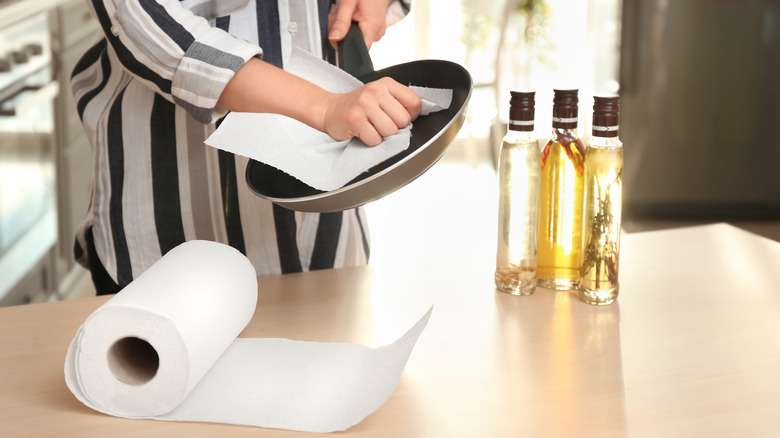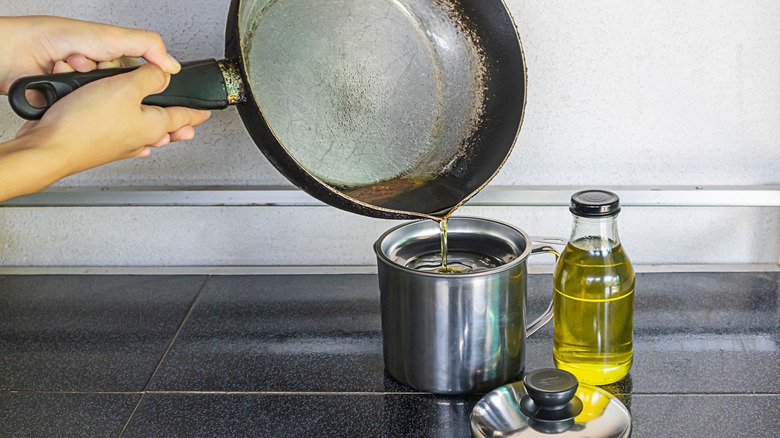Martha Stewart's Paper Towel Hack To Safely Get Rid Of Cooking Oil
Some of the best things in life come fried in hot oil. Consider the pure joy of eating perfectly golden, sugared donuts while they're still warm. Or the satisfaction of a plateful of extra crispy, sweet, and spicy Korean fried chicken. If it were not for frying in fat, we wouldn't have onion rings, churros, tempura, falafel, or french fries. Quelle horreur! As much as we love eating fried foods, the not-so-enjoyable part is having to clean up afterward. Whether deep frying corn fritters in a cast iron skillet, or shallow frying pork chops in a non-stick pan, the leftover cooking oil needs to be properly and safely dealt with.
The one way you should never deal with it is by pouring it into your sink. Even small amounts of oil down the drain can add up and lead to major plumbing problems. Fats like oil, butter, and grease can solidify in your pipes, causing clogs, back-ups, and worse.
Leave it to domestic lifestyle queen Martha Stewart to have an easy and practical solution. In a TikTok video titled "How To Soak Up Oil in a Pan," she shared her #cookingtok hack by demonstrating how to simply sop up the remaining oil with paper towels, and then dispose of them in the trash. It's an excellent way to get rid of the oil without making a mess, and more importantly, keeps the oil out of your kitchen's plumbing and connected sewer lines — where it can cause real damage.
Oil and plumbing do not mix
When fats, oils, and grease (FOG) go down your drain, they don't disappear — they accumulate in your pipes and, in time, cause blockages. This results in more than just a slow-draining sink, leading to sewage overflowing into your home and water supply. FOG build-up is the main cause of blocked sewers in the United States. As oils and greases cool, they solidify and harden inside your plumbing and sewers, building up into the aptly named fatbergs. The myth that pouring hot water and dish soap into the sink after oil dissolves the mess is not true. While the water and soap may partially dislodge a blockage, it's just being flushed further down the pipes — where it will congeal again. To avoid cooking up your own kitchen pipe fatbergs, Martha Stewart's paper towel hack comes in extremely handy.
@marthastewart Dispose of your used cooking oil with this easy technique! #cookingtip #cookingtok
In her TikTok video, she explains that you can easily dispose of used cooking oil or melted butter using the technique. She takes a big wad of what appears to be at least five or six sheets of paper towel and carefully lays them directly into a pan filled with about an inch of hot oil. She instructs viewers to "let it soak up all that oil," while moving the paper around in a wiping motion. She says the pan will cool off quickly and can then be safely washed. No oil makes it into the sink, and you can just discard the paper towels in the trash.
Reuse or recycle cooking oil
Martha Stewart gets straight to "paper toweling" while her oil is still hot, suggesting that the paper will cool down the pan. However, it is always safer to let the oil cool completely before handling it.
Even though Martha Stewart's method for getting rid of cooking oil is super effective, many social media commenters noted that paper towels are expensive and that using so many is wasteful. Furthermore, many mentioned reusing their cooking oil, which is actually an acceptable way to reduce food waste and save money. To save it for reuse, strain the cooled oil using a cheesecloth or coffee filter to remove any food particles. Once clean, pour the strained oil into a covered container and store it in the refrigerator. Discard if the oil is cloudy or smells.
If you frequently cook with oil and find yourself wondering how to get rid of it, you might consider a designated pour can to store it in until ready to discard. Glass jars or metal coffee cans with lids work well for this purpose. Once your oil has cooled, pour it into the can and store it under the sink or in the fridge. Pour your used cooking oil into it each time, then once the container is full, you can throw it into the trash. Larger amounts of oil such as from cleaning a deep fryer or generated by restaurants should always be taken in for recycling or disposed of properly according to local ordinances.



